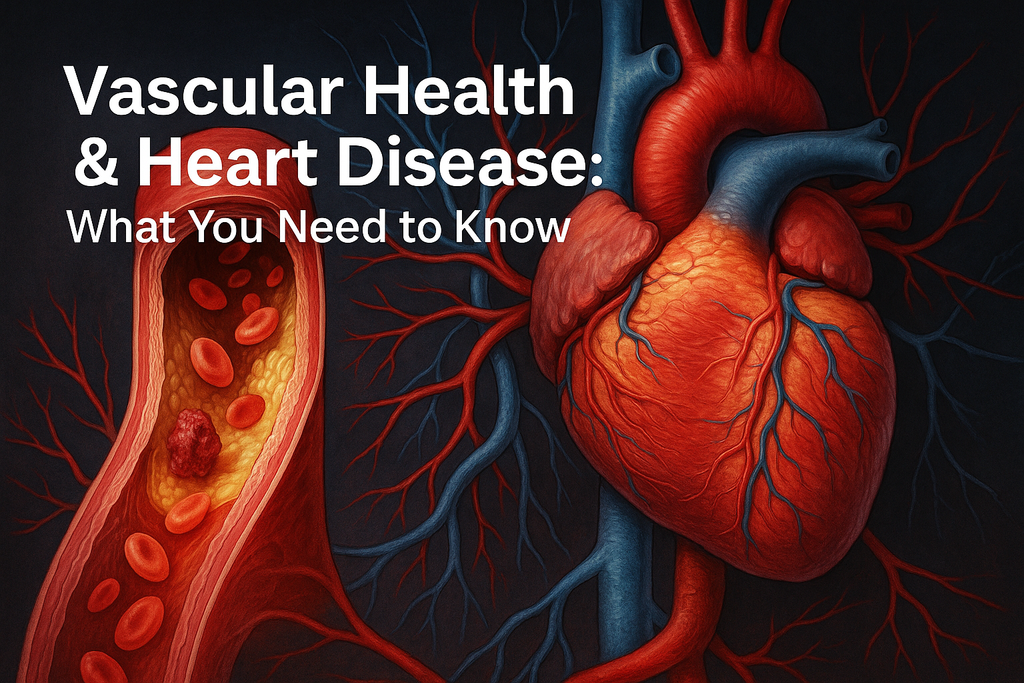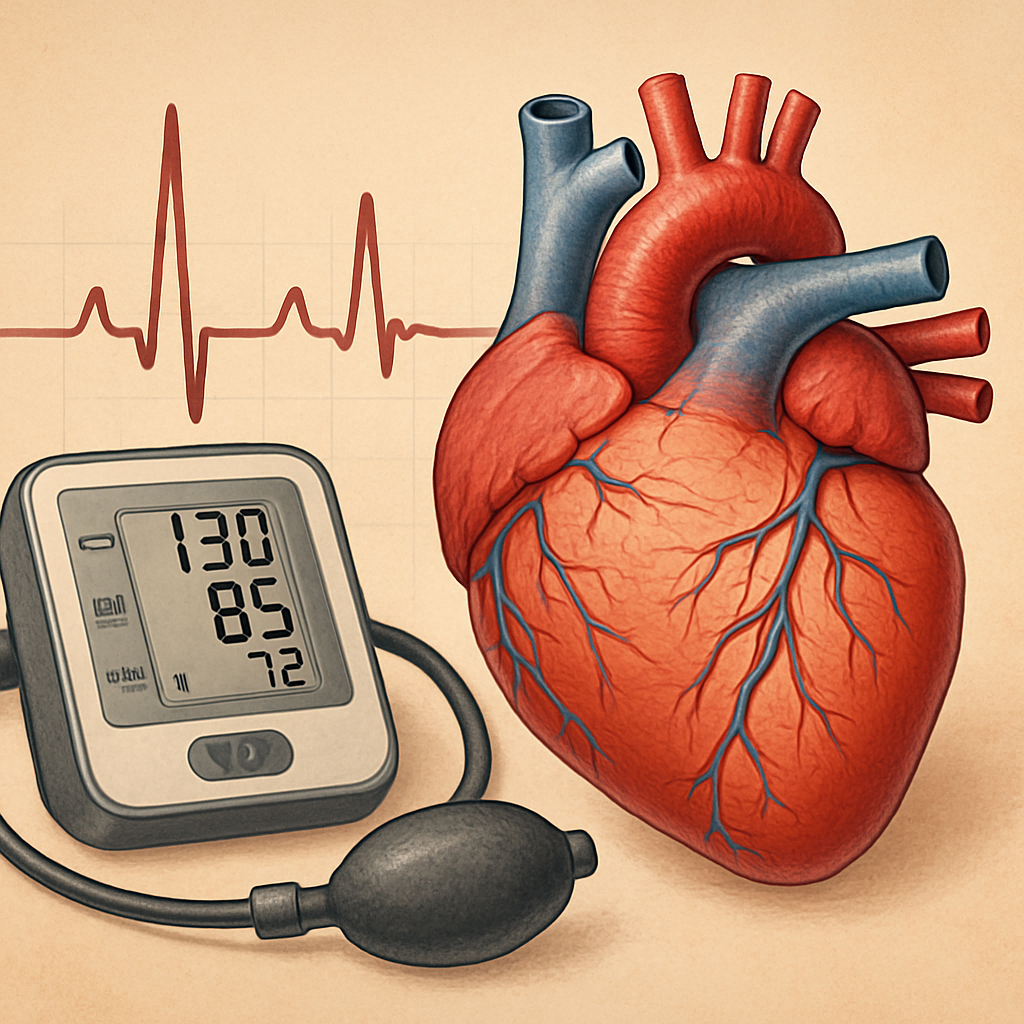News — cholesterol
The Link Between Vascular Health and Heart Disease: What You Need to Know
artery health atherosclerosis blood vessels cardiovascular system cholesterol circulation CoQ10 endothelial function healthy arteries heart attack prevention heart disease heart support high blood pressure inflammation magnesium nitric oxide omega-3 vascular health vascular supplements vein health
Heart disease doesn't happen overnight. It’s the result of a slow and often silent process that begins in your blood vessels. Vascular health—the condition of your arteries, veins, and capillaries—is the foundation upon which your cardiovascular system operates. When your vessels are clear, elastic, and strong, blood flows freely, delivering oxygen and nutrients where they’re needed most. But when vascular health declines, the heart must work harder, and the risk of heart disease climbs.
Understanding how your vascular system influences heart function is essential to preventing cardiovascular complications. This article unpacks the critical connection between blood vessels and heart disease and offers actionable insights on how to strengthen your vascular system for lifelong cardiovascular wellness.
How Blood Pressure Affects Your Heart: Causes, Symptoms, and Prevention
blood circulation blood pressure blood pressure causes blood pressure management blood pressure monitoring blood pressure treatment cardiovascular disease cholesterol DASH diet healthy lifestyle heart attack heart failure prevention heart function heart health high blood pressure symptoms hypertension hypotension low blood pressure Mediterranean diet risk factors stroke prevention
Blood pressure plays a crucial role in the functioning of your heart and overall cardiovascular system. Often dubbed the "silent killer," high blood pressure (hypertension) can quietly damage your heart over time, increasing the risk of life-threatening conditions. On the flip side, low blood pressure (hypotension) may also pose health challenges, leading to dizziness, fainting, and inadequate blood flow to vital organs.
Understanding how blood pressure influences heart health is essential for anyone looking to maintain a healthy cardiovascular system. This comprehensive guide dives deep into the intricate relationship between blood pressure and your heart, exploring causes, symptoms, risk factors, and preventative measures to help you take control of your heart health.
Understanding Good vs. Bad Cholesterol: How to Lower LDL and Increase HDL
bad cholesterol cardiovascular health cholesterol cholesterol diet cholesterol levels cholesterol management cholesterol medications cholesterol support exercise for cholesterol foods for cholesterol good cholesterol HDL cholesterol healthy cholesterol heart health how to improve cholesterol increase HDL LDL cholesterol lower LDL natural supplements triglycerides
When people hear the word “cholesterol,” they often associate it with heart attacks and poor health. But cholesterol isn't inherently bad—it’s essential for building cells and producing hormones. The challenge lies in the balance between the two types: LDL (low-density lipoprotein) and HDL (high-density lipoprotein). These are more commonly known as the “bad” and “good” cholesterol, respectively. Understanding the difference and how each type affects your body is crucial to maintaining cardiovascular health and reducing your risk of chronic diseases.
In this article, we’ll dive deep into what sets LDL and HDL apart, the science behind how they work, and actionable steps you can take to lower your LDL while boosting your HDL. Whether you're managing high cholesterol or simply aiming to optimize your long-term health, this guide offers everything you need to know—backed by research and easy to implement in your daily life.
Omega-3 Fatty Acids: The Ultimate Heart-Healthy Superfood
ALA anti-inflammatory cardiovascular health cholesterol DHA EPA fatty fish fish oil healthy diet heart disease prevention heart health mental health omega-3 omega-3 omega-3 benefits omega-3 fatty acids omega-3 foods omega-3 for inflammation omega-3 supplements plant-based omega-3
Omega-3 fatty acids have earned a stellar reputation as one of the most important nutrients for heart health. These essential fats are not only vital for overall well-being, but they also play a critical role in reducing the risk of heart disease, lowering inflammation, and improving cholesterol levels. While the body cannot produce omega-3s on its own, they can easily be obtained through diet or supplements, making them a key part of a heart-healthy lifestyle.
Research consistently shows that people who consume higher amounts of omega-3 fatty acids experience numerous health benefits, particularly for their cardiovascular system. Whether it’s through fish, plant-based sources, or supplements, incorporating omega-3s into your daily routine can have long-lasting positive effects on your heart health. In this guide, we’ll explore the different types of omega-3s, their benefits, and the best ways to include them in your diet.
Mulberry Leaf for Blood Sugar Control and Diabetes Management
anti-inflammatory antioxidant blood sugar control blood sugar levels cholesterol diabetes diabetes care diabetes management DNJ glucose regulation heart health herbal remedies insulin sensitivity mulberry leaf mulberry leaf benefits mulberry leaf supplements mulberry leaf tea natural blood sugar management natural health natural remedies for diabetes
Mulberry leaves have been used for centuries in traditional medicine, particularly in Asia, for their myriad health benefits. Recent studies have highlighted their potential in blood sugar regulation, making them an attractive option for those looking for natural ways to manage diabetes. The benefits of mulberry leaf for blood sugar control are profound, offering a natural and holistic approach to maintaining healthy glucose levels. This article delves into the science behind mulberry leaf’s role in blood sugar management, its benefits, how to incorporate it into your routine, and much more.





